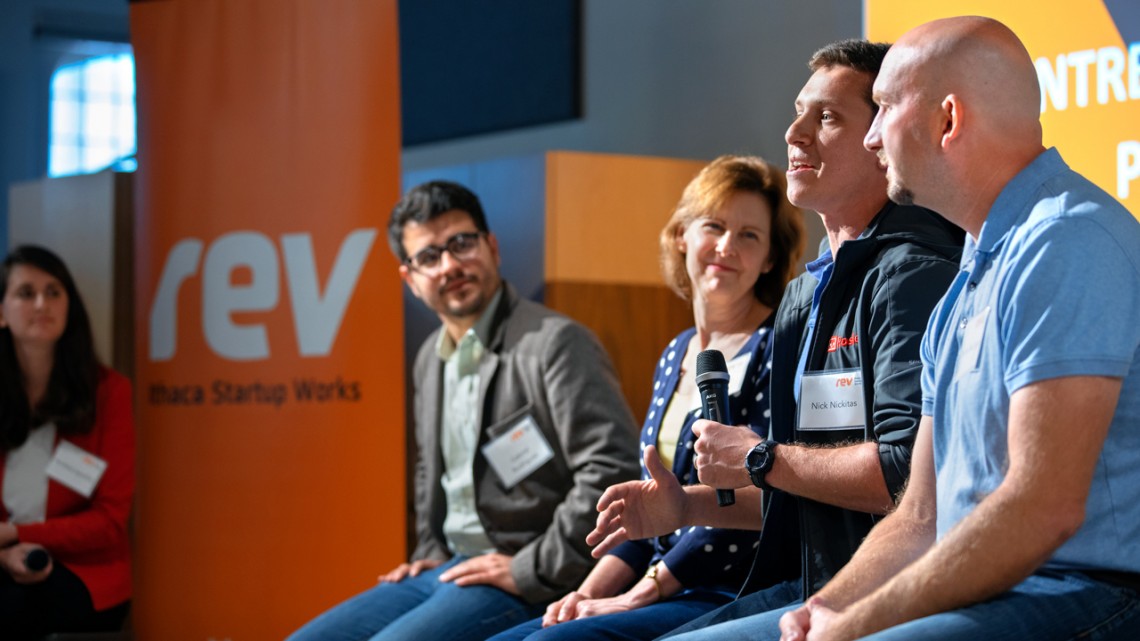
Entrepreneurs participate in a panel discussion June 27 at Rev. From left, panel facilitator Andrea Ippolito, ’06, M.Eng. ’07, executive director of Cornell’s Engineering Management Program; Gabriel Rodriguez-Calero, Ph.D. ’14, founder of Ecolectro; Julie Baker, co-founder and vice president of Ursa Space Systems; Nick Nickitas, MBA ’14, CEO of Rosie Applications; and Charlie Mulligan, MBA ’11, CEO of GiveGab.
Ithaca entrepreneurs light up region’s startup economy
By Susan Kelley
Ithaca and the surrounding region are bright spots in upstate New York’s startup economy, according to panelists at a recent “who’s who” gathering of the local entrepreneurship community.
Rev: Ithaca Startup Works, a partnership of Cornell, Ithaca College and Tompkins Cortland Community College, hosted the event, “State of Ithaca’s Startup Economy,” June 27 to discuss how the community can encourage a steady pace of startup growth. Panelists included investors, real estate professionals (including Jeremy Thomas, Cornell’s senior director of real estate) and entrepreneurs.
People frequently ask what Ithaca can do to become the next Silicon Valley, said Tom Schryver ’93, MBA ’02, executive director of the Cornell Center for Regional Economic Advancement, in his opening keynote talk. But he and many others reject that line of thinking, he said. “We have no interest in becoming anyone else. We want to be the best ‘us’ that we can possibly be,” Schryver said. “We’ve got a lot of tremendous assets here that can make us a strong, great Ithaca and region.”
Those assets include university research and development, “a foundational asset upon which an innovation economy is built,” Schryver said. The Southern Tier has more university research and development and more students per capita than anywhere else in the state.
Paradoxically, upstate receives only 8 percent of all venture capital funding in New York, while downstate gets 92 percent – a whopping portion, especially as New York state is No. 3 in the country in attracting venture capital funding. “We continue to have work to do in terms of developing sources of capital here upstate,” Schryver said, “but there are a lot of sparks of light.”
For example, Cayuga Venture Fund, which includes partner Jennifer Tegan, MBA ’01, funded GiveGab, a fundraising platform for nonprofits founded by Cornell MBAs. That funding prompted national investors to back the startup, too. And Ursa Space Systems recently closed a round of $8 million in funding with RRE Ventures, a top-tier New York City venture fund, and NEA, a national company with offices in Palo Alto and Baltimore. “We are starting to see more … of these large-scale investors being willing to come in here,” Schryver said.
Funding also comes from the region’s angel investor network. It includes Susan Fleming, M.S. ’08, Ph.D. ’10, faculty director of the entrepreneurship minor at the Cornell SC Johnson College of Business. She’s an active board member on Firelight Camps, a Rev member planning to expand nationwide.
Rev members have had a meaningful impact on the local economy. Last year, these startups created 92 jobs, raised $21 million in capital and generated $8.2 million in revenue, Schryver said.
Added Mary Opperman, Cornell’s vice president and chief human resources officer: “The startup community is strong, and Cornell’s commitment to that community continues. We need to continue to track startups, retain them and help them set their roots here.”
A Cornell education was a common thread among the entrepreneur panelists. Several had developed their businesses while students with university support.
Facilitated by Andrea Ippolito ’06, M.Eng. ’07, executive director of Cornell’s Engineering Management Program, the panel discussed where they get their top hires. Several found quality employees through Cornell’s Dual Career Program, which offers job search information and assistance to the spouses of new Cornell employees, and have hired spouses of people attending or working for area colleges and universities. “They’re looking for career development, so that’s a big talent pool for us,” said Nick Nickitas, MBA ’14, CEO of Rosie Applications, an e-commerce company. Rosie also hires students as interns in their sophomore year, he added.
To secure funding, entrepreneurs must have a solid business plan and an interest in understanding investors’ needs, said Gabriel Rodriguez-Calero, Ph.D. ’14. Since founding Ecolectro, a chemical company that develops and manufactures enhanced specialty polymers developed at Cornell, he has secured more than $1 million. “Be receptive to the mentors and the people who have [raised funds] successfully in the community, and I think that will provide a lot of insights and input,” he said.
Added Julie Baker, co-founder and vice president of Ursa: “There are good resources here. It depends on the idea that you have.”
Ithaca entrepreneurs must master the art of importing capital from outside the region, Nikitas said. GiveGab CEO Charlie Mulligan, MBA ’11, disagreed. “Capital brought us here. … At the end of the day, we’ve always found capital here.”
Ken Rother, director of Rev, said Ithaca’s startup economy is gaining momentum, and it’s up to everyone to help build up even more speed. “When a new entrepreneur comes in … it’s really incumbent on all of us to make it as easy as possible to get that entrepreneur up and running,” Rother said. “That’s really one of the great parts of Ithaca.”
Media Contact
Get Cornell news delivered right to your inbox.
Subscribe
